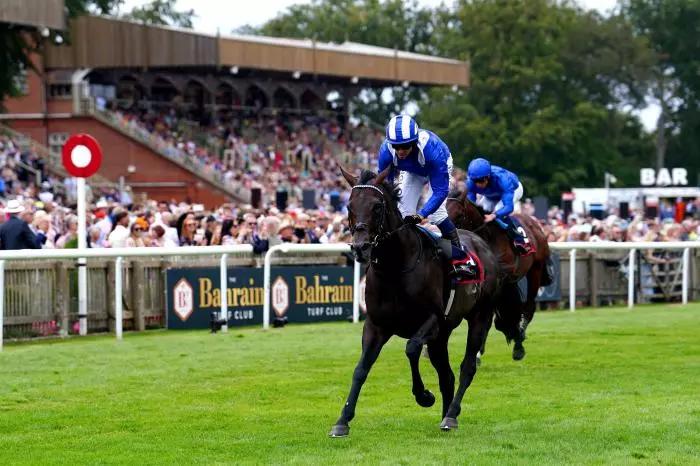Edward D. Brown, the former slave who won the Belmont Stakes

The story of Edward Dudley Brown is remarkable, starting as a slave and going on to win the Belmont Stakes and ultimately breeding, training and trading racehorses.
Born in Kentucky thoroughbred country, Edward Dudley Brown was one of a group of slaves who, although tied to a life of servitude, gained fleeting sporting freedom atop racehorses as jockeys.
Yet few would make the impact Brown did, and it was only after his death that American sport really came to understand the achievements of a man who went from slavery to winning the Belmont Stakes.
Sold at the age of seven to Woodburn Stud owner Robert A. Alexander, Brown quickly showed a talent for horsemanship while working as a stable boy.
Due to the dreadful power dynamics of slavery, records for Edward D. Brown's early career as a jockey are sketchy. The quick Brown, who was said to be a talented sprinter, picked up the nickname "Brown Dick" due to comparisons in speed with a famous horse of the same name.
This meant that race records often referred to the jockey as simply "Dick" or, more disturbingly, being the property of Robert Alexander as "Alexander's Dick".
Nevertheless, Brown began to make a name for himself in his own right, winning his first race on Alexander's horse Asteroid when he was just 14. A year later, the Thirteenth Amendment was passed, releasing slaves into somewhat limited emancipation.
Brown, like many former slaves, continued working for their old owners and he carried on riding for Alexander until his employer died in 1867. Daniel Swigert, the former Woodburn manager, then tempted Brown over to his new racing venture and the pair set about winning several stakes races on such capable horses as Virgil, who sired three Kentucky Derby winners.
Swigert had bought an up-and-coming horse named Kingfisher, bred by the old Alexander operation, and targeted the Belmont Stakes. There was only one jockey he trusted with such a race - Edward D. Brown - and he sent the pair to New York in 1870.
The race was held at the Jerome Park racetrack in the Bronx and Kingfisher lined up against six other capable horses. The Belmont Stakes had been inaugurated just three years earlier and Brown was ready to make a splash in Yankee country on Kingfisher.
Brown had Kingfisher flying from the off, leading from Midday and Doneraile, and the jockey born into Kentucky slavery was able to find room to settle his horse into a strong rhythm.
Coming down the stretch, Brown guided Kingfisher into a two length lead from Foster and Midday, who were vying for second. Ultimately, both Foster and Midday's tussle was academic as Brown's superior riding and Kingfisher's stamina over 1 5/8 miles saw them home in a time of 2:59.5.
Almost as an afterthought, Brown had become the first African-American to win the Belmont Stakes, which would, in time, become the final leg of the US Triple Crown.
Yet Brown wasn't finished there, proving that his horsemanship wasn't just limited to riding winners but also in breeding, training and trading racehorses. Brown won the 1877 Kentucky Derby with Baden-Baden, a horse he had personally conditioned for the victory.
When he had saved up enough money, Brown set up his own stables which raced under the moniker Ed Brown and Co. Brown showed his skill for judging equine talent, buying and then selling future Kentucky Derby winner Plaudit.
Perhaps Brown's greatest feat of talent scouting came in the form of Ben Brush, bought for $1,200 as a yearling and then traded for more than 10 times the sum. Ben Brush was another of Brown's finds that went on to win the Kentucky Derby. Perhaps more importantly, he became a leading sire, featuring in the pedigrees of various modern day champions.
After Brown was inducted into the National Museum of Racing and Hall of Fame in 1984, a plaque dedicated to the equine expert was placed in Midway, Kentucky, where he is buried.
Kentucky Governor Brereton Jones spoke succinctly about Brown's remarkable career at the unveiling, saying that Brown "speaks very loudly and clearly that this is the thoroughbred capital of the world and that anybody who is willing to work can be a success."
Jones continued: "Because if a black man in the midst of slavery can succeed at it, surely the rest of us as free people, who are inhibited only by our own lack of vision or lack of fortitude, can succeed."
Even in the modern day, with million dollar Belmont Stakes purses, Edward Dudley Brown can be seen as a horseman ahead of his time, who found space to breathe on the racetrack.




